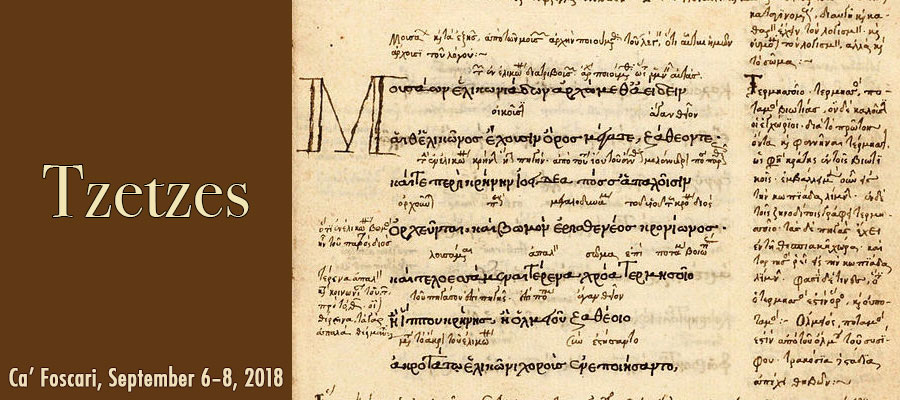Tzetzes, Ca’ Foscari, September 6–8, 2018
John Tzetzes was a towering figure in the scholarly landscape of twelfth-century Constantinople, and his name crops up time and again in modern scholarship, Classical and Byzantine alike. He commented extensively on poets such as Homer, Hesiod, Aristophanes, and the intractable Lycophron. He is a source of the greatest importance for the history and transmission of scholarship in antiquity. He had access to works that are lost to us; he may have been the last person to read Hipponax at first hand before the age of papyrological discoveries.
Gifted with a cantankerous personality which he made no attempt to conceal, he had a very high opinion of his own worth as a scholar and a correspondingly low opinion of almost everybody else’s. He was the sort of person who would pepper his letters with erudite references, then compose an enormous poem to elucidate them and write scholia to it. His idiosyncratic writerly persona has made him an easy target for the irony of twentieth-century scholars; Martin West dubbed him a ’lovable buffoon’, and he was kinder to him than others.
It is all too easy, especially for classicists, not to see beyond a combination of Tzetzes the caricature and Tzetzes the footnote fodder; someone to use without engaging too closely. But his vast learning and the variety and influence of his writings demands a more discerning attention. The past few decades have witnessed an increasing interest in his works, with several editions (and more in progress), a steady flow of articles, and even a few translations into modern languages. The time is ripe for scholars in classical and Byzantine studies to join forces towards a better understanding of Tzetzes and his output.
The colloquium will take place in Ca’ Foscari, the University’s historical core, in the scenic Aula Baratto, overlooking the Grand Canal. The address is Dorsoduro 3246, 30123 Venice.
There is no registration fee, but space is limited, so participants are kindly requested to register their interest by emailing the organiser at enricoemanuele.prodi@unive.it by 31st July 2018.
